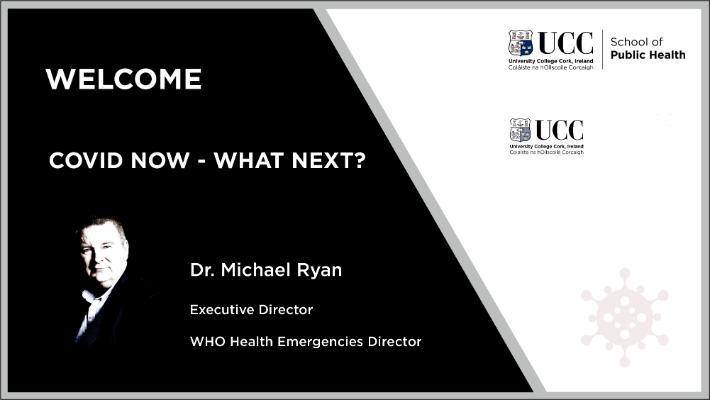WHO’s Dr. Mike Ryan to address the next phase of COVID-19 and preventing the next pandemic at UCC Webinar

Dr Mike Ryan, Executive Director of the World Health Organization (WHO) Health Emergencies Programme joins leading experts from UCC’s School of Public Health and UCC’s Centre for Global Development for today’s webinar exploring the next phase of the COVID-19 pandemic and solutions to prevent future public health challenges.
The webinar ‘COVID Now – What Next?’ will take place from 12.30pm to 2pm. A recording of the event will be available after the event.
- Mike Ryan said: “We are seeing signs that things are improving but we know too there are gaps - many people around the world are not protected, there are many systems that are still very weak, we don’t know how this virus will continue to evolve.”
- Ryan said he is concerned “we have lost capacity to detect that new variant quickly. At the peak of the pandemic while we might have been under huge pressure we were having lots of testing and sequencing. We were detecting new variants quite efficiently and characterising them very well”.
He cautioned that while people get back to their lives we need to stay vigilant – “everyone just needs to be smart, smart about your own risks, smart about your own exposure and smart about getting vaccinated”.
Governments he said need to make sure that “we can integrate our surveillance and our testing, our treatment and our vaccination programme into the normal health service and continue to deliver them efficiently. Continue to protect people and let the health system and let society recover”.
Patricia Kearney, Professor of Epidemiology, School of Public Health, UCC said: “one of the learnings post-pandemic is there is an appreciation for power of vaccines, power of science.
Visibility of public health she said has been a real strength of the pandemic – “there is an understanding that there are things that we can do at a population level that protects people.
“We know vaccination works we saw that with COVID. That is true also for flu vaccines which will become available quite soon and for child immunization. Vaccination is just a really important tool in preventing disease”.
Prof. Kearney said there is a greater awareness now of how we live, of the issues facing us as a global society ie climate change, sustainability, obesity.
“We are more aware of the way our societies are structured and function so thinking about things like having better infrastructure that facilitates walking, cycling, being outdoors. We see that is better in terms of infectious disease transmission, in terms of the environment and in terms of preventing physical inactivity.
Professor Ivan Perry, Professor of Public Health, School of Public Health, UCC said: “We are likely to see numbers of those with COVID rise again as we approach winter so we need to stay vigilant and wear a mask when using public transport, a properly fitting N95 mask. Ensure public buildings are well ventilated, work from home as much as we can”.
Professor Ella Arensman, Interim Head of UCC’s School of Public Health and Chief Scientist, National Suicide Research Foundation UCC said: "Research conducted during the COVID pandemic, demonstrated increased levels of alcohol misuse, depression, anxiety and domestic violence associated with intensified public health measures. Therefore, the full range of responses must be considered beyond physical illness to prepare the global society more effectively for future pandemics".
Today’s panelists will focus on country-level COVID-19 pandemic response analysis and lessons learned.
- Professor Ivan Perry, Professor of Public Health, School of Public Health, UCC.
- Colette Cunningham, Lecturer in Global Health, School of Public Health UCC who has more than 20 years experience with International NGOs and civil society dedicating her work to the promotion of poverty eradication, health for all, maternal and child health.
- Professor Ella Arensman, Interim Head of UCC’s School of Public Health and Chief Scientist, National Suicide Research Foundation UCC.
- Professor Patricia Kearney, Professor of Epidemiology, School of Public Health UCC
- Rosarii Griffin, Interim Director of the Centre for Global Development, UCC and is a Board member of the US based Global Virus Network (GVN).
- Anne Sheahan, Area Director of Public Health, HSE Department of Public Health (Cork & Kerry)
- Peter Barrett, Consultant in Public Health Medicine, HSE Depart. of Public Health (Cork & Kerry)
- Professor Gerry Killeen, Ecology and Epidemiology, AXA Research Chair, School of Biological, Earth and Environmental Sciences, UCC
- Brian Turner, Economist & Lecturer, Dept. of Economics, Cork University Business School, UCC
- Fatia Kiyange, Director, CEHURD, Uganda
- Dr Denis Kibera, Medicines Transparency Alliance, Uganda
LINKS to updated COVID figures here:
National COVID stats
https://covid19ireland-geohive.hub.arcgis.com/
European COVID stats
https://www.ecdc.europa.eu/en/cases-2019-ncov-eueea
World COVID Stats
https://www.worldometers.info/coronavirus/
WHO COVID INFO SITE
https://www.who.int/emergencies/diseases/novel-coronavirus-2019
The Centre for Global Development at UCC is very interested in the impact of Covid on the world's least developed countries, especially the Global South, particularly in terms of meeting our collective global commitment to the UN Sustainable Development Goals (SDGs), especially in health and education.
For more on this story contact:
Helen Kelleher, Media & Communications Manager, College of Medicine and Health, University College Cork.
Tel: 0876899930
Email: hkelleher@ucc.ie
Twitter: @UCCMedHealth
- ucc.ie/en/med-health/
- ucc.ie/en/publichealth/
School of Public Health
Scoil na Sláinte Poiblí
Contact us
4th Floor, Western Gateway Building, Western Road,
